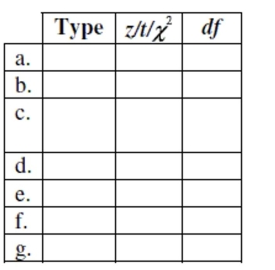Test identification Suppose you were asked to analyze each of the situations described below. (NOTE: Do not do these problems!) For each, indicate which procedure you would use (pick the appropriate number from the list), the test statistic , or "chi-squared"), and, if or , the number of degrees of freedom. A procedure may be used more than once.
1. proportion - 1 sample
2. difference of proportions - 2 samples
3. mean - 1 sample
4. difference of means - independent samples
5. mean of differences - matched pairs
6. goodness of fit
7. homogeneity
8. independence
a. Among randomly selected pets, 27% of the 188 dogs and 18% of the 167 cats had fleas.
Does this indicate a significant difference in rates of flea problems for these two pets?
b. Are there more broken bones in summer or winter? We get records about the number of
fractures treated in January and July at a random sample of 25 emergency rooms.
c. A random sample of 600 high school seniors reported their grade point averages and the
amount of financial aid offered them by colleges. We wonder if there is an association
between academic success and college aid.
d. For a random sample of 200 drivers at a gas station, we record the driver's gender (male
or female) and the type of gasoline purchased (regular, plus, or premium). We wonder if
there is an association between a driver's gender and the type of gasoline they buy.
e. The school newspaper wants a 95% confidence interval for the road test failure rate. In a
random sample of 65 student drivers, 37 said they failed their driver's test at least once.
f. A supermarket chain wants to know which of two merchandise display methods is more
effective. They randomly assign 15 stores to use display type A and 15 others to use display
type B, then collect data about the number of items sold at each store.
g. Tags placed on garbage cans allow the disposal of up to 30 pounds of garbage. A
random sample of 22 cans averaged 33.2 pounds with a standard deviation of 3.2 pounds.
Is this strong evidence that residents overload their garbage cans?
Definitions:
Deviant Behavior
Deviant behavior involves actions that deviate from the accepted norms, values, or standards of a society or community.
Goal-Means Gap
The disparity between culturally approved goals and the availability of legitimate means to achieve these goals, often cited in strain theory as a cause of deviance.
Ritualism
The adherence to or performance of rituals or ceremonial acts as part of a culture, religion, or group membership.
Status Frustration
A psychological condition resulting from an individual's inability to achieve his or her expected social status, leading to feelings of inadequacy and disappointment.
Q17: Last weekend police ticketed 18 men whose
Q41: Describe the W's, if the information is
Q67: In a local school, vending machines
Q80: Which of the following are NOT characteristics
Q117: Which of the W's are unknown for
Q127: Do you think there is a pattern?
Q131: A biology professor reports that historically
Q394: Gun control Two friends who strongly disagree
Q777: The residuals plot for a linear model
Q780: If you think that the temperature might